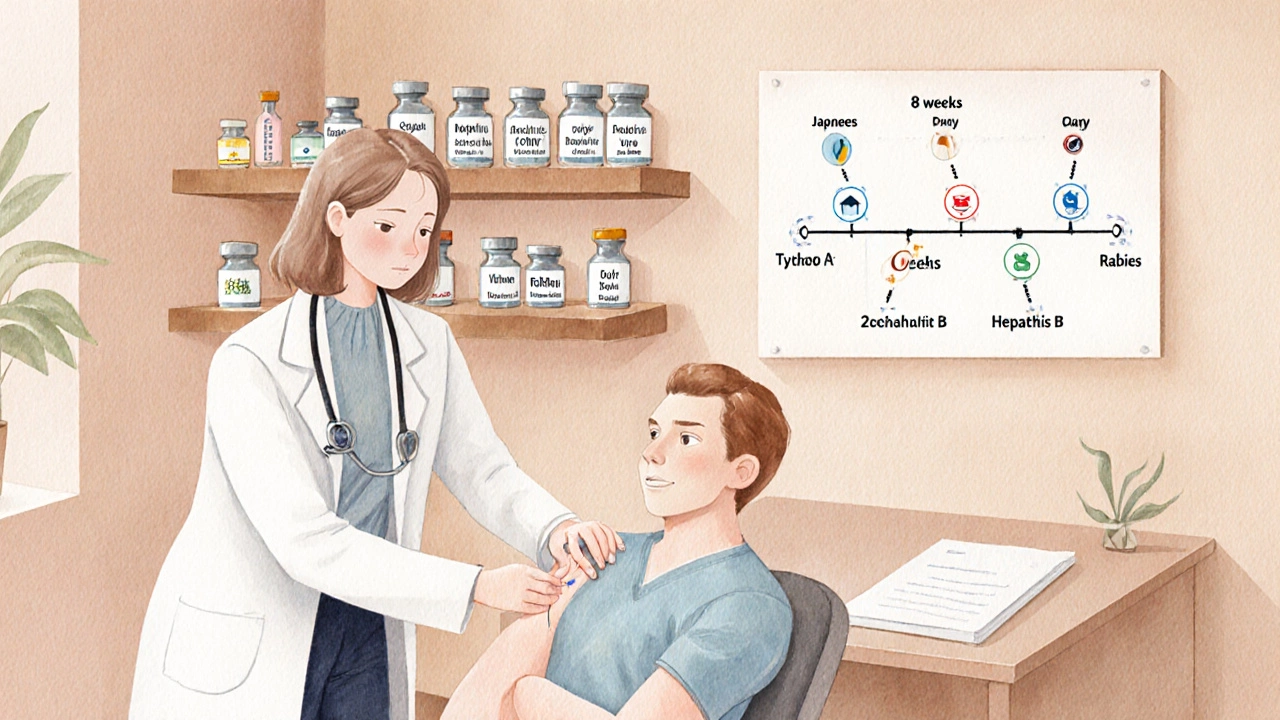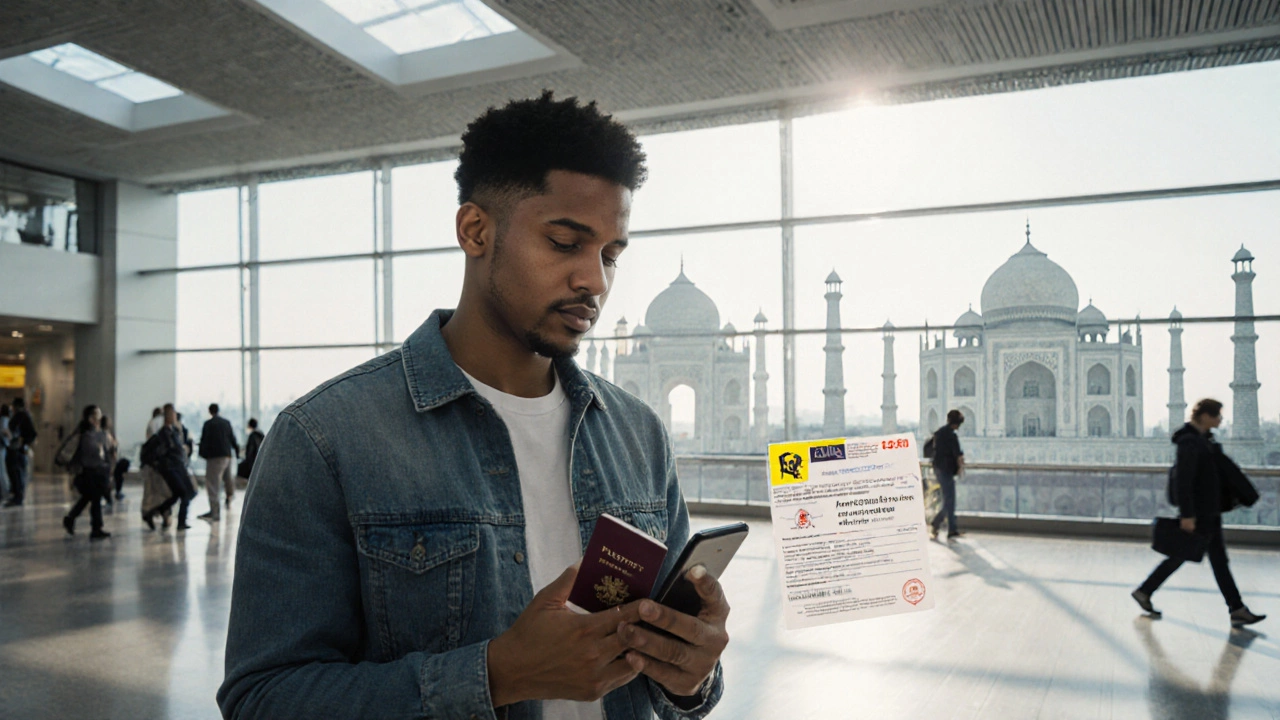India Travel Vaccine Planner
Planning a trip to India and wondering if you need any shots before you board the plane? The short answer is yes - while India doesn’t impose a strict list of mandatory vaccines for U.S. citizens, several vaccinations are strongly recommended, and a few are required under special circumstances. This guide walks you through exactly what you need, why it matters, and how to get ready without missing a beat.
What the Indian Government Actually Requires
India’s Ministry of Health & Family Welfare does not enforce a universal vaccine passport for tourists. The only compulsory immunization is Yellow Fever a viral disease transmitted by mosquitoes, required only if you’re arriving from a country with yellow‑fever risk. Since the United States is not a yellow‑fever endemic nation, most American travelers can skip the certificate unless they’ve visited a risk country within the last 12months.
Vaccines That Health Experts Almost Always Recommend
Even if a vaccine isn’t legally required, the Centers for Disease Control and Prevention (CDC) and the World Health Organization (WHO) list several shots that protect you from diseases common in the subcontinent. Below is a quick rundown of the most important ones:
- Hepatitis A a liver infection spread through contaminated food and water, recommended for all travelers
- Typhoid bacterial illness transmitted via unsafe food or water, especially useful for those planning to eat street food
- COVID‑19 SARS‑CoV‑2 virus; most airlines still ask for proof of full vaccination or a negative test
- Hepatitis B blood‑borne virus; advisable if you might have medical procedures or sexual contact
- Rabies virus carried by dogs and wildlife; consider if you’ll be in rural areas or handling animals
- Japanese Encephalitis mosquito‑borne virus found in parts of eastern India, recommended for long stays in rural regions
- Typhoid bacterial infection spread through food, especially street‑food lovers
When Timing Matters: Scheduling Your Shots
Most vaccines need a lead‑time to become effective. Here’s a practical timeline you can follow:
- Start planning at least 8weeks before departure. This gives you room for multi‑dose series (e.g., Hepatitis A/B, Rabies).
- Schedule a brief pre‑travel clinic visit. A qualified travel‑medicine doctor can assess your health history and suggest the right mix.
- If you need YellowFever (rare for Americans), get the vaccine at least 10days before entry - that’s the window the certificate remains valid.
- For COVID‑19, ensure you are fully boosted with a WHO‑approved vaccine at least 2weeks before you fly.
- Keep a copy of all vaccination records (paper and digital) handy for airline check‑in and potential health‑official inquiries.

Where to Get Your Travel Shots in the United States
Most major hospitals, urgent‑care centers, and pharmacy chains (CVS, Walgreens, Walmart) offer travel vaccines. Look for a clinic that has a CDC‑approved travel‑medicine specialist - they’ll have the latest recommendations and can provide a printed International Certificate of Vaccination (ICV). Prices vary, but typical costs in 2025 range from $50 for HepatitisA to $200 for a full Rabies series. Many insurance plans cover at least part of the expense if you get a doctor's referral.
Quick Comparison: Required vs. Recommended
| Vaccine | Legal Requirement | Recommended For | Typical Schedule |
|---|---|---|---|
| Yellow Fever | Only if arriving from a risk country | Travelers from endemic zones | Single dose ≥10 days before travel |
| Hepatitis A | No | All travelers | 2‑dose series, 0 & 6 months |
| Typhoid | No | Food‑adventurous, rural stays | Oral 4‑dose over 1 week or single injection |
| COVID‑19 | Airline policies may require proof | Everyone | Full primary series + booster 2 weeks prior |
| Hepatitis B | No | Long stays, medical work, sexual activity | 3‑dose series over 6 months (accelerated 0,1,2 months) |
| Rabies | No | Rural travel, wildlife contact | 3‑dose series pre‑travel, plus boosters if risk persists |
| Japanese Encephalitis | No | Extended stays in rural eastern India (e.g., Assam, West Bengal) | 2‑dose series, 0 & 28 days |
Common Pitfalls and How to Avoid Them
- Waiting until the last minute. Some vaccines need multiple doses; booking 8weeks early prevents scramble.
- Assuming "no requirement" means "no need". Even if India doesn’t demand a shot, catching HepatitisA or Typhoid early saves you from a nasty stomach bug.
- Skipping the certificate. Airlines may ask to see proof of COVID‑19 vaccination at check‑in; keep a digital copy on your phone.
- Overlooking regional risks. If you plan a trek in the Himalayas, Japanese Encephalitis becomes relevant; if you’ll stay in big cities, it’s less critical.
- Not checking insurance coverage. Some plans reimburse travel vaccines when ordered through a primary‑care physician, not a pharmacy.

What to Do If You Forget a Shot
Real life happens. If you arrive in India and realize you missed a recommended vaccine, you have options:
- Visit a reputable private hospital in major cities (e.g., Apollo in Delhi, Fortis in Mumbai). They can administer most travel vaccines on short notice.
- Check with your embassy’s health hotline. They often list trusted clinics for expatriates and travelers.
- Remember that some vaccines (like HepatitisA) are still effective if given after exposure, though they won’t prevent the infection that’s already taken hold.
Key Takeaways
While India doesn’t force most U.S. travelers to show a vaccination record, being prepared dramatically reduces health risks and smooths airline procedures. Focus on getting YellowFever (if applicable), HepatitisA, Typhoid, COVID‑19, and any disease specific to your itinerary. Schedule early, keep documentation, and use a trusted travel‑medicine clinic.
Frequently Asked Questions
Do I need a Yellow Fever certificate to enter India?
Only if you’re arriving from a country where Yellow Fever is present. The United States is not on that list, so most American tourists can skip it.
Is the COVID‑19 vaccine still required for flights to India?
Airlines often ask for proof of full vaccination or a negative test. While India itself doesn’t mandate it at the border, showing the vaccine eases boarding and may avoid quarantine if you test positive en route.
Can I get the Typhoid vaccine in a pharmacy?
Yes. Major pharmacy chains carry the injectable Typhoid vaccine, and many also offer the oral capsule series. Ask the pharmacist for a prescription if required by state law.
How long before travel should I get the Hepatitis A shot?
A single dose offers protection within two weeks, but the full two‑dose series (6‑month gap) gives the longest immunity. Aim for the first dose at least 2weeks before departure.
What should I do if I develop a fever after arriving in India?
Seek medical care at a reputable hospital immediately. Bring your vaccination record; doctors will know which diseases to rule out based on your immunizations.
